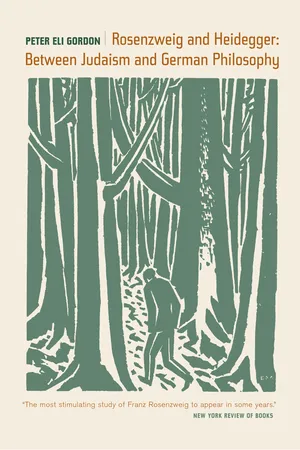
- 357 pages
- English
- PDF
- Available on iOS & Android
Weimar and Now: German Cultural Criticism
About This Book
Franz Rosenzweig (1886-1929) is widely regarded today as one of the most original and intellectually challenging figures within the so-called renaissance of German-Jewish thought in the Weimar period. The architect of a unique kind of existential theology, and an important influence upon such philosophers as Walter Benjamin, Martin Buber, Leo Strauss, and Emmanuel Levinas, Rosenzweig is remembered chiefly as a "Jewish thinker, " often to the neglect of his broader philosophical concerns. Cutting across the artificial divide that the traumatic memory of National Socialism has drawn between German and Jewish philosophy, this book seeks to restore Rosenzweig's thought to the German philosophical horizon in which it first took shape. It is the first English-language study to explore Rosenzweig's enduring debt to Hegel's political theory, neo-Kantianism, and life-philosophy; the book also provides a new, systematic reading of Rosenzweig's major work, The Star of Redemption. Most of all, the book sets out to explore a surprising but deep affinity between Rosenzweig's thought and that of his contemporary, the German philosopher Martin Heidegger. Resisting both apologetics and condemnation, Gordon suggests that Heidegger's engagement with Nazism should not obscure the profound and intellectually compelling bond in the once-shared tradition of modern German and Jewish thought. A remarkably lucid discussion of two notably difficult thinkers, this book represents an eloquent attempt to bridge the forced distinction between modern Jewish thought and the history of modern German philosophy—and to show that such a distinction cannot be sustained without doing violence to both.
Frequently asked questions
Information
Table of contents
- CONTENTS
- ABBREVIATIONS
- ACKNOWLEDGMENTS
- PREFACE
- Introduction: Germans, Jews, and the Transformation of Weimar Philosophy
- 1. Toward Metaphysics: Cohen's Opus Postumum and the Origins of the New Thinking
- 2. Hegel’s Fate: The Emergence of Finitude in Rosenzweig’s Hegel and the State
- 3. Beyond Metaphysics: Rosenzweig’s Star (Part I)
- 4. Redemption-in-the-World: Rosenzweig’s Star (Part II)
- 5. “Facing the Wooded Ridge”: The Hebrew Bible in the German Horizon
- 6. “An Irony in the History of Spirit”: Rosenzweig, Heidegger, and the Davos Disputation
- Conclusion: Germans, Jews, and the Politics of Interpretation
- INDEX